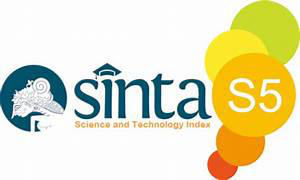PROSES KOMUNIKASI PELAKU USAHA KULINER DALAM MEMPEROLEH SERTIFIKASI HALAL DI KOTA BANDA ACEH
Abstract
Halal tourism is an accelerated development program carried out by the government in several regions in Indonesia. Aceh has been designated as a center for the development of halal tourist destinations. The increasing number of Muslim tourist visits has an effect on the provision of food and beverage products (culinary). The increase in tourist visits is not matched by the availability of halal-certified food and drinks. One of the reasons is the interest of culinary business actors to seek information about halal certification. This study aims to identify the characteristics of culinary business actors and analyze their communication process in obtaining halal certificates. This research was conducted in Banda Aceh-Indonesia in January-February 2020, using survey methods and in-depth interviews. The population determination and sample selection were carried out by purposive sampling with 77 respondents from culinary businesses and simple random sampling. Data were analyzed using Partial Least Square (PLS) analysis. The results of the study show that the characteristics of culinary business actors are MSMEs which are dominated by young entrepreneurs. PLS analysis shows that the characteristic factor (0.080) has no effect on the communication process. On the other hand, institutional support (0.709) has a significant effect on the communication process..
Keywords
References
Abdul M, Ismail H, Mustapha M, Kusuma H. 2013. Indonesian Small Medium Enterprises (Smes) And Perceptions On Halal Food Certification. African Journal of Business Management. 7(16):1 492-503
Aziz A, Chok NV. 2012. The Role Of Halal Awareness and Halal Certification In Influencing Non-Muslims Purchase Intention. Journal of International Food & Agribusiness Marketing, 25 (1): 1-23
Age A, Obinne C, Demenongu T. 2012. Communication For Sustainable Rural and Agricultural Development In Benue State, Nigeria. Sustainable Agric Res. 1(1):118-129
BPS. (2010). Retrieved Desember 30, 2016, from Biro Pusat Statistik: http://sp2010.bps.go.id/index.php/site/tabel?tid=321
Baharuddin K, Kassim NA, Nordin SK, Buyong SZ. 2015. Understanding The Halal Concept And The Importance Of Information On Halal Food Business Needed By Potential Malaysian Entrepreneurs. International Journal of Academic Research in Business and Social Sciences. 5(2):170-184.
Bimo W. 2007. Psikologi Kelompok. Yogyakarta (ID): Andi Offfset
Bohari AM, Cheng WH, Fuad N. 2013. An Analysis On The Competitiveness Of Halal Food Industry In Malaysia: An Approach Of SWOT And ICT Strategy. Geografia:
Malaysian Journal of Society and Space. 9(1):1-11.
Gilley KM, Rasheed A. 2000. Making more by doing less: an analysis of outsourcing and its effects on firm performance. Journal of management. 26(4):763-790.
Hidayat AS, Siradj M. 2015. Sertifikasi Halal dan Sertifikasi Non Halal pada Produk Pangan Industri. AHKAM: Jurnal Ilmu Syariah. 15(2).
Komunikasi Profesional: Perangkat Pengembangan Diri. Kampus IPB Taman Kencana: Bogor.
Kementerian Pariwisata. 2019. Laporan Akhir Periode. Jakarta (ID): Kemenpar
Kurniasih,Lubis DP, Ginting B. 2014. Proses Komunikasi Pelaksanaan Program Satu Milyar Satu Kecamatan Di Provinsi Jambi. Jurnal Komunikasi Pembangunan. 12(2): 1-19
Maryati T, Syarief R, Hasbullah R. 2017. Analisis Faktor Kendala dalam Pengajuan Sertifikat Halal.(Studi Kasus: Pelaku Usaha Mikro, Kecil dan Menengah Makanan Beku diJabodetabek). Jurnal Ilmu Produksi dan Teknologi Hasil Peternakan. 4(3):364-371.
McCartney G, Butler R, Bennett M. 2008. A Strategic Use Of The Communication Mix In The Destination Image-Formation Process. Journal of Travel Research. 47(2):183-196.
[MPU]. Majelis Permusyawaratan Ulama. 2019 Laporan Akhir Periode. Banda Aceh (ID): Majelis Permusyawaratan Ulama Aceh.
Muchtar MS. 2016. Penerapan Komunikasi Partisipatif pada Pembangunan di Indonesia. Jurnal FKSB: MAKNA. 1(1) : 1-14
Mujiburrahmad M, Muljono P, Sadono D. 2015. Kinerja Penyuluh Pertanian di Kabupaten Pidie Provinsi Aceh dalam Melaksanakan Tugas dan Fungsi. Jurnal Penyuluhan. 10(2):42-51
Munizu M. 2010. Pengaruh Faktor-Faktor Eksternal dan Internal Terhadap Kinerja Usaha Mikro dan Kecil (UMK) Di Sulawesi Selatan. Jurnal Manajemen dan Kewirausahaan (Journal of Management and Entrepreneurship). 12(1): 33-41.
Quantaniah N, Noreina SN. 2013. Selecting Halal Food: A Comparative Study Of The Muslim And Non Muslim Malaysian Student Consumer. Di dalam: editor. 2nd International Conference on Technology Management, Business and Entrepreneurship
Regenstein J.M, Chaudry M.M, Regenstein C.E The kosher and halal food laws. Comprehensive reviews in food science and food safety. 2(3): 111-127.
Rogers EM, Shoemaker FF. 1971. Communication of Innovations. New York (US): The Free Press
Salman F, Siddiqui KA. 2011. An exploratory study for measuring consumers awareness and perceptions towards halal food in Pakistan. Interdisciplinary Journal of Contemporary Research in Business. 3 (2) : 639-651
Soekanto S. 2007. Sosiologi Suatu Pengantar. Jakarta (ID): Raja Grafindo Persada
Su C, Yang Z, Zhuang G, Zhou N, Dou W. 2009. Interpersonal influence as an alternative channel communication behavior in emerging markets: The case of China. J Int Bus Stud. 40(4):668-689.
Wibowo CT, Hafidhuddin D, Agung SS. 2015. Pola Komunikasi Pada Pengembangan Kapasitas Kewirausahaan Petani Sayuran (Kasus Pendampingan Misi Teknik Taiwan di Kabupaten Boyolali dan Bogor). Jurnal Komunikasi Pembangunan. 10(1): 1-10
Zainal M, Lubis D, Rangkuti P. 2014. Pola Komunikasi Partisipatif pada Program Pengembangan Usaha Agribisnis Perdesaan di Kabupaten Bogor. Jurnal Komunikasi Pembangunan. 12(2):80-90.
DOI: 10.33751/jpsik.v5i2.4432
Refbacks
- There are currently no refbacks.

This work is licensed under a Creative Commons Attribution-ShareAlike 4.0 International License.













